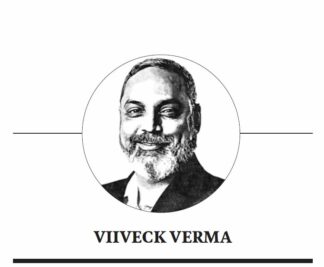Opinion: The art of saying No
The discomfort of saying no pales in comparison to the long-term satisfaction of living authentically and intentionally

By Viiveck Verma
In an era where exhaustion is worn like a badge of honour, the power of saying ‘no’ is often overlooked. Turning down a request should be simple, yet for many, it feels like navigating a minefield of guilt, self-doubt, and the worry of disappointing others. However, the ability to establish firm yet thoughtful boundaries isn’t just a skill, it’s a necessity. It safeguards mental well-being, strengthens genuine connections, and ensures that personal and professional ambitions remain on track.
Also Read
- Opinion: Seek accountability gently
- Opinion: Art of speaking to yourself
- Opinion: Ambition and well-being
- Opinion: Embrace imperfection
- Opinion: Accept chaos for well-being
- Opinion: The power of habit
- Opinion: The art of giving up
- Opinion: Owning mistakes works wonders
- Opinion: Art of judicious postponing
- Opinion: Leadership without self-centering
The hesitation to say no often stems from deep-seated cultural and psychological influences. Society tends to lionise selflessness, conflating generosity with self-sacrifice. From a young age, many of us are taught to prioritise the comfort and needs of others over our own, creating a subconscious association between refusal and selfishness. This conditioning is particularly pronounced in workplaces, where overworking is often equated with dedication, and in relationships, where saying yes is misinterpreted as love or loyalty.
Cost of Acquiescence
But let’s consider the cost of perpetual acquiescence. When we say yes to everything, every project, favour, or invitation, we inadvertently say no to ourselves. Time, energy, and mental bandwidth are finite resources, and overextending them leads to exhaustion, resentment and diminished performance. We compromise our ability to be present for the commitments that truly matter. In essence, we risk becoming unreliable to everyone because we try to be indispensable to everyone.
A no, when delivered honestly and constructively, can deepen trust and signal that you value the relationship enough to be truthful rather than overpromise
The guilt that arises when we set boundaries is a powerful deterrent, but it is not a justification for avoidance. Guilt, in this context, is often the residue of internalised expectations rather than an accurate moral compass. A reluctant agreement can sow resentment over time, far more insidious than a polite, well-explained no.
Defining Responsibilities
Boundary-setting, however, is not about erecting impenetrable walls. It is about defining where your responsibilities end and others’ begin. Healthy boundaries ensure mutual respect and clarity in relationships, not alienation. The challenge lies in mastering the delicate balance between firmness and empathy, delivering your no without leaving the other party feeling devalued or dismissed. The key to achieving this balance lies in framing.
A well-delivered no focuses on clarity, sincerity, and respect. Consider this, “I can’t take on this project right now because I need to prioritise existing commitments, but I appreciate you thinking of me.” It communicates your position transparently while acknowledging the other person’s needs. Importantly, it avoids over-apologising, which can dilute your message and create room for negotiation where none exists.
Some argue that outright refusals, however skillful, can harm professional or personal relationships. I, however, challenge this perspective. A no, when delivered honestly and constructively, can deepen trust. It signals that you value the relationship enough to be truthful rather than overpromise and underdeliver. People who respect your boundaries often respect you more because of them. Conversely, those who react negatively to your refusal may be benefiting disproportionately from your lack of boundaries — a dynamic worth scrutinising.
Know your Priorities
That said, mastering the art of saying no requires more than tactical phrasing. It demands introspection and a clear understanding of your priorities. Without clarity about what truly matters to you, every request may seem urgent or essential. By regularly evaluating your goals and values, you can assess each opportunity through a lens of intentionality rather than reflexive compliance. Ask yourself, does this align with what I want for myself? Does saying yes bring me closer to my objectives, or is it an emotional reaction driven by guilt or fear? There is also a broader societal implication to consider.
When individuals habitually overcommit, they perpetuate a culture of unsustainable expectations. In workplaces, this often results in ‘hero syndrome’, where employees who stretch themselves thin are celebrated, creating an implicit pressure for others to follow suit. By setting boundaries and modelling sustainable practices, we can collectively foster environments that value balance over burnout.
Of course, there are nuances to saying no, particularly in cultures or communities where refusal carries significant social or familial weight. In such contexts, the challenge lies not only in setting boundaries but in recalibrating the expectations of those around you. This can be achieved incrementally, by beginning with smaller refusals and gradually expanding your comfort zone. Over time, your consistent boundary-setting can shift perceptions and normalize the practice.
In my experience, the most effective boundary-setters are those who view the word ‘no’ not as a rejection but as a redirection. A no can be an invitation to explore alternative solutions, to delegate, or to reconsider priorities. For example, if a colleague asks you to take on a task that doesn’t align with your bandwidth, suggesting someone else who may be better suited to the role demonstrates thoughtfulness while still preserving your boundaries.
Ultimately, the art of saying no is deeply personal and contextual. It is not a one-size-fits-all skill but a dynamic practice that evolves with your circumstances, relationships, and self-awareness. There will be times when your refusal is met with disappointment or resistance. And that is inevitable. But over time, the discomfort of saying no pales in comparison to the long-term satisfaction of living authentically and intentionally. By embracing the art of saying no, you reclaim your time, energy, and identity, without guilt and with profound respect for yourself and others. And that, I believe, is a yes worth pursuing.

(The author is founder and CEO, Upsurge Global, co-founder Global Carbon Warriors and Adjunct Professor, EThames College)
Related News
-
Kabaddi player Ramavath Nandi returns after two major knee surgeries
4 mins ago -
KP Vivekananda slams Revanth Reddy over failed governance
6 mins ago -
Harish Rao condemns Balka Suman’s arrest, accuses Congress of undermining democracy
11 mins ago -
BJP expresses willingness to join hands with BRS for Khanapur municipal election
13 mins ago -
BRSV president slams Congress for arresting Balka Suman, calls for bandh on Thursday
13 mins ago -
Fertilizer booking app fails to end farmers’ urea troubles in Karimnagar
15 mins ago -
KTR condemns arrest of Balka Suman, seeks SEC and Governor’s intervention
15 mins ago -
Police continue crackdown on BRS with arrest of Balka Suman in Mancherial
13 mins ago




